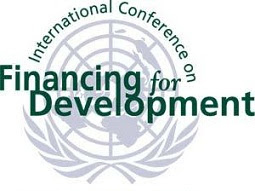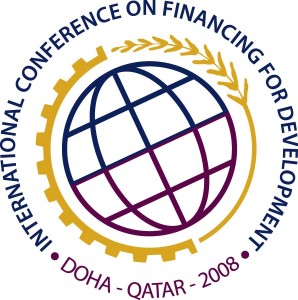Outcome Document
History of the FfD Process
 The International Conference on Financing for Development (Monterrey, Mexico, 18-22 March 2002) signaled a turning point in the approach to development cooperation by the international community. It was the first United Nations-sponsored summit-level meeting to address key financial and related issues pertaining to global development. With more than 50 Heads of State and Government and over 200 ministers of foreign affairs, trade, development and finance – the largest ever participation of finance officials at a United Nations-sponsored event – the Conference succeeded in placing financing for development firmly on the global agenda.
The International Conference on Financing for Development (Monterrey, Mexico, 18-22 March 2002) signaled a turning point in the approach to development cooperation by the international community. It was the first United Nations-sponsored summit-level meeting to address key financial and related issues pertaining to global development. With more than 50 Heads of State and Government and over 200 ministers of foreign affairs, trade, development and finance – the largest ever participation of finance officials at a United Nations-sponsored event – the Conference succeeded in placing financing for development firmly on the global agenda.
The Monterrey Consensus reflects a landmark global agreement between developed and developing countries, in which both recognized their responsibilities in key areas such as trade, aid, debt relief and institution building.
 The 2008 Follow-up International Conference on Financing for Development to Review the Implementation of the Monterrey Consensus (Doha, Qatar, 29 November – 2 December 2008) adopted the Doha Declaration which recognized that mobilizing financial resources for development and the effective use of all those resources were central to the global partnership for sustainable development. Given the global economic situation at the time, the Doha Declaration called for a United Nations Conference at the highest level to examine the impact of the world financial and economic crisis on development.
The 2008 Follow-up International Conference on Financing for Development to Review the Implementation of the Monterrey Consensus (Doha, Qatar, 29 November – 2 December 2008) adopted the Doha Declaration which recognized that mobilizing financial resources for development and the effective use of all those resources were central to the global partnership for sustainable development. Given the global economic situation at the time, the Doha Declaration called for a United Nations Conference at the highest level to examine the impact of the world financial and economic crisis on development.
The United Nations Conference on the World Financial and Economic Crisis and Its Impact on Development was held in New York from 24 to 30 June 2009. It provided a uniquely inclusive forum to identify emergency and long-term responses to mitigate the impact of the crisis and initiate a dialogue on the transformation of the international financial architecture.
The Third International Conference on Financing for Development will seek to (1) assess the progress made in the implementation of the Monterrey Consensus and the Doha Declaration; (2) address new and emerging issues; and (3) reinvigorate and strengthen the financing for development follow-up process.
See also: